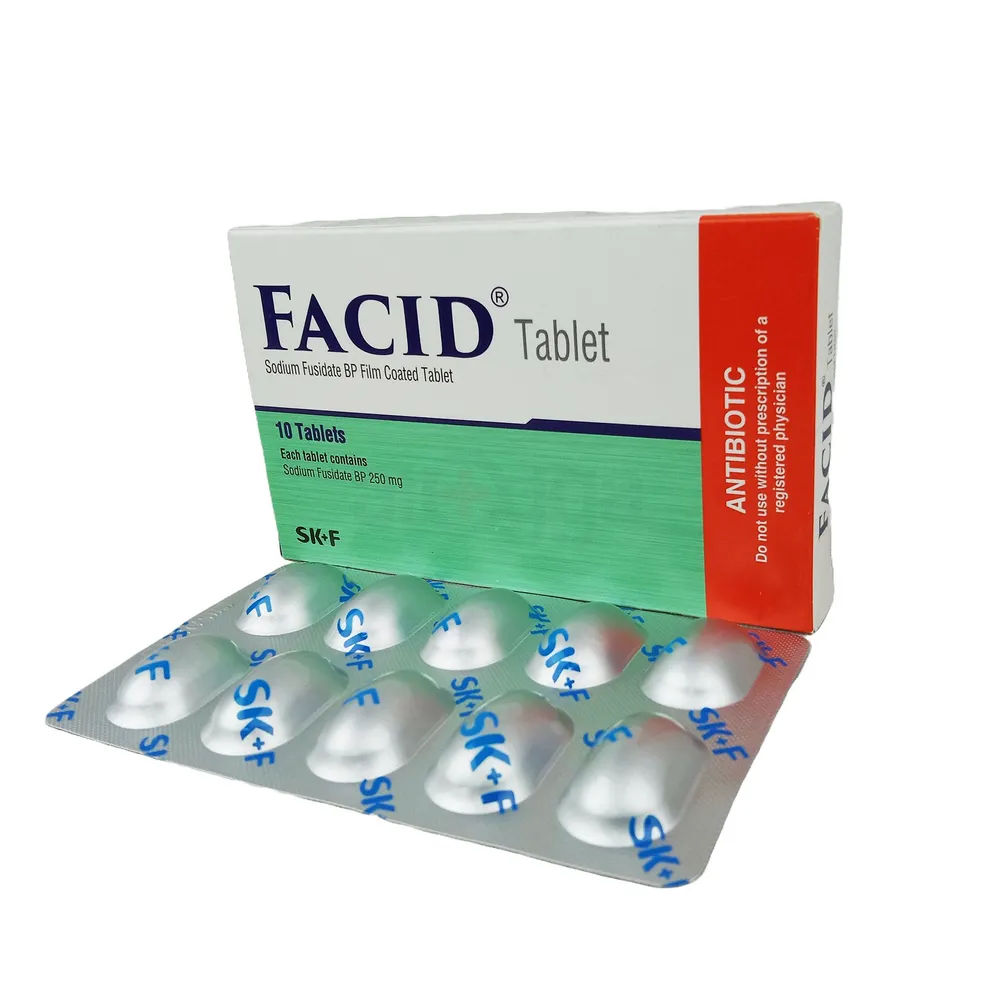

12-24 Hours
ব্যবসার জন্য পাইকারি দামে পণ্য কিনতে রেজিস্টেশন করুন
Register
0 People recently viewed this
Facid 250
Eskayef Pharmaceuticals Ltd.
Generic: Sodium Fusidate (Fusidic Acid)
Safety Advices
বাংলা
English
SAFE IF PRESCRIBED
Facid 250 is generally considered safe to use during pregnancy. Animal studies have shown low or no adverse effects to the developing baby; however, there are limited human studies.
SAFE IF PRESCRIBED
Facid 250 is probably safe to use during breastfeeding. Limited human data suggests that the drug does not represent any significant risk to the baby.
Medicine Overview of Facid 250mg Tablet
Introduction
Facid 250 is an antibiotic. It is used in the treatment of bacterial skin infections. It relieves the symptoms of the infection by stopping the further growth of the causative microorganisms. Facid 250 should be used in the dose and duration as prescribed by your doctor. This medicine is for external use only and should be used regularly to get the most benefit from it. Don't use more than you need as it won't clear your condition faster and some side effects may be increased. The affected area should be clean and dry before application of the ointment. You must...
... Show moreUses of Facid 250
- Bacterial skin infections
Side effects of Facid 250
Common
- Application site reactions (burning, irritation, itching and redness)
How to use Facid 250
This medicine is for external use only. Use it in the dose and duration as advised by your doctor. Check the label for directions before use. Clean and dry the affected area and gently massage the ointment.
How Facid 250 works
Facid 250 is an antibiotic. It works against bacteria that cause skin infections by preventing the synthesis of essential proteins necessary for survival of bacteria. Thus, it prevents the skin infection from spreading.
Quick Tips
- Do not use Facid 250 more often or for longer than advised by your doctor.
- Before each application, wash the affected area with soap and water and dry well.
- Avoid getting in the eyes, nose, or mouth. If accidental exposure occurs, rinse immediately with plenty of water.
- Cover the area being treated with airtight dressings such as bandages if suggested by the doctor.
- Take precaution while applying the medicine around your eyes or the eyes of a child.
Brief Description
Indication
Acne vulgaris, Skin infections, Conjunctivitis, staphylococcal infections
Administration
Should be taken with food.
Adult Dose
Oral
Susceptible infections
Adult: 500 mg tid. May increase to 1 g tid in fulminating infections.
Child Dose
Oral
Susceptible infections
Child: <1 yr: About 15 mg/kg;
1-5 yr: 250 mg;
5-12 yr: 500 mg.
Doses to be taken tid.
Contraindication
Hypersensitivity.
Mode of Action
Fusidic acid disrupts translocation of peptide subunits and elongating the peptide chain of susceptible bacteria, thus inhibiting protein synthesis.
Precaution
Hepatic disease; monitor liver function. Neonates; pregnancy, lactation.
Side Effect
Jaundice and liver dysfunction (reversible); GI disturbances. IV: Venospasm, thrombophloebitis and haemolysis; hypocalcaemia. SC/IM: Tissue necrosis. Topical: Rashes and irritation.
Interaction
Synergistic action with antistaphylococcal penicillin. Antagonism with ciprofloxacin.
ব্যবসার জন্য পাইকারি দামে পণ্য কিনতে রেজিস্টেশন করুন
Register